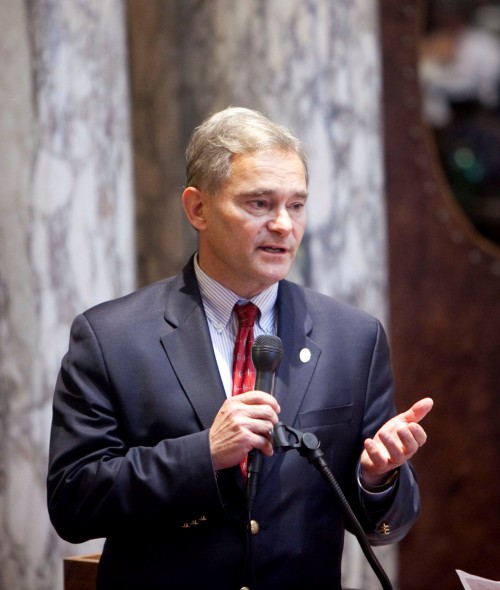Medicaid Expansion Could Save $380 Million
Total savings to taxpayers lost by June 2019: $1.07 billion.
There are many reasons why it makes sense for Wisconsin to modestly increase the eligibility ceiling for BadgerCare. A new memo by the Legislative Fiscal Bureau (LFB) sheds light on and strengthens one of those reasons – the large savings for Wisconsin from increasing the BadgerCare eligibility standard for adults.
Ironically, the ongoing efforts to repeal or undermine the Affordable Care Act (ACA) may also bolster the case for expanding BadgerCare, since the individual insurance Marketplace created by the ACA was Governor Walker’s rationale for sharply reducing BadgerCare eligibility. But let’s come back to that point after taking a closer look at the fiscal effect of expansion.
Under the Affordable Care Act, states that expand eligibility of adults to 138% of the federal poverty level are eligible for substantially higher federal cost sharing. Taking that step would qualify Wisconsin for reimbursement of at least 90% federal funding for the costs of covering childless adults, compared to the 58% reimbursement rate in effect now. As a result, even though expanding BadgerCare eligibility for adults to 138% of the poverty level (from 100% now) would cover at least 80,000 more people, it would yield very large savings that could help fill a number of holes in the state budget.
The new LFB memo, released April 3rd by Representative Barca, provides the following estimates of the potential savings:
- Having an expansion of BadgerCare in place for all of the 2017-19 biennial budget period would yield a net savings for Wisconsin taxpayers of $380 million.
- If the expansion of eligibility had taken effect in April of 2014, Wisconsin could have saved $1.07 billion from that date through June 30, 2019 (which is the end of the upcoming two-year budget period).
The memo notes that these are preliminary figures, which the LFB will be updating in the coming weeks. Although the numbers may be revised a little, these estimates make it clear that a modest BadgerCare expansion could play a very important role in helping Wisconsin policymakers meet many budget needs, in areas like education, health care, and transportation. Although it’s probably too late to pass and implement an expansion that would yield savings right from the July 1 start of the next fiscal year, the faster the state acts, the sooner it can tap the potential savings of about $190 million per year.
Needless to say, the question of whether to expand BadgerCare and capture the higher federal reimbursement level is complicated by the fact that many Republicans have advocated repealing the ACA. However, they haven’t been able to find the votes for ACA repeal in the House, and opposition to the proposed “repeal and replace” legislation is even stronger in the Senate. Many Republican senators and governors support the Medicaid expansions in their states, which is why the proposed legislation would continue the higher federal reimbursement rate – at least for the childless adults enrolled in Medicaid or BadgerCare by a certain date.
If Trump’s prediction does become a self-fulfilling prophecy, which I think is likely, that will be particularly problematic in Wisconsin because our state policymakers moved more than 60,000 Wisconsinites off BadgerCare in 2014 – based on the Governor’s argument that they could get their coverage through the federal Marketplace. The collapse of that Marketplace would be a cruel blow to those former BadgerCare participants, as well as a political problem for the Governor. However, the state can mitigate the problems by expanding BadgerCare to adults up to 138% of the poverty level.
Before deciding whether to expand BadgerCare, Wisconsin legislators will need to monitor federal actions relating to the ACA. If the ACA’s increased funding for Medicaid expansions is repealed, then increasing BadgerCare eligibility probably doesn’t make sense this session. On the other hand, if the funding for Medicaid expansions is continued, and if the Trump Administration’s actions cause or allow a Marketplace collapse, then Wisconsin lawmakers need to expand BadgerCare in order to protect vulnerable families, prevent a sharp increase in uninsured Wisconsinites, and head off a surge in uncompensated care.
Wisconsin Budget
-
Charting The Racial Disparities In State’s Prisons
 Nov 28th, 2021 by Tamarine Cornelius
Nov 28th, 2021 by Tamarine Cornelius
-
State’s $1 Billion Tax Cut Leaves Out 49% of Taxpayers
 Sep 21st, 2021 by Tamarine Cornelius
Sep 21st, 2021 by Tamarine Cornelius
-
TANF Program Serves a Fraction of Poor Families
 Aug 30th, 2021 by Jon Peacock
Aug 30th, 2021 by Jon Peacock




















